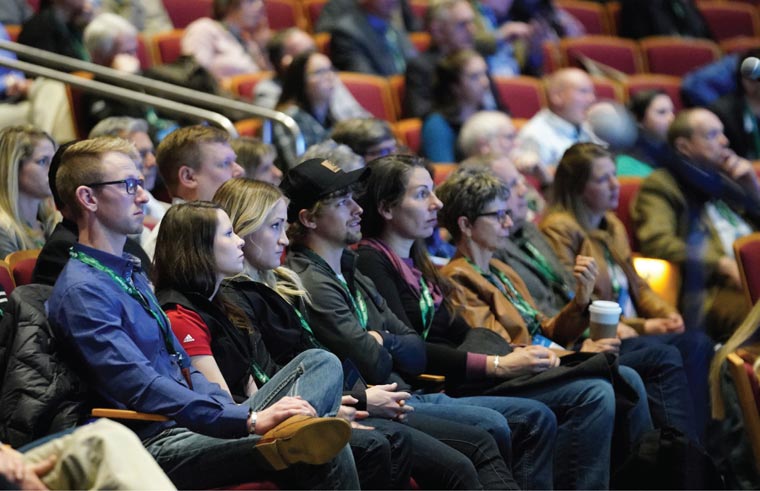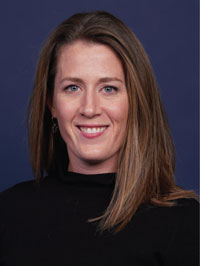
February 15, 2020
Early-career equine vets face challenges
Dr. Allison Williard West, an associate veterinarian at Auburn Equine in Auburn, California, has been out in the field for nearly four years, but she still feels like a new graduate.
“My biggest challenge since starting as an associate is establishing relationships with clients and trying to prove myself,” she told JAVMA News.
Many young veterinarians face obstacles when beginning their careers, however, equine veterinarians can face specific issues others may not. A table topic session at the American Association of Equine Practitioners’ annual convention, Dec. 7-11, 2019, in Denver, focused on those issues. The speakers during the session were Dr. Sam Johnson, owner of Glenwood Veterinary Clinic in Glenwood Springs, Colorado; Dr. Caitlin Daly, owner of Mid Coast Equine in Waldoboro, Maine; and Dr. Angie Yates, owner of Yates Equine Veterinary Services in Indianapolis.

They discussed what the major concerns are for younger equine veterinarians, how to sustain an equine veterinary career, tips for balancing work and personal hobbies, and potential mentoring opportunities.
Dr. Williard West has found that building client relationships can be difficult because her practice was previously owned and operated by one veterinarian for three decades.
“All of his clientele loved him—he really was a great man—but as a young, female new graduate, it has been hard to fill those extra-large shoes,” Dr. Williard West said. “The other challenge for me, in particular, is that my external features do not match my age, and therefore I am constantly getting questions like, ‘Are you sure you’re old enough to be a veterinarian?’ It can be very frustrating to smile and nod and take it all in stride. I feel like any mistakes that I make will be that much more criticized. However, I have great support from my associates and my office staff, which makes me lucky.”
Dr. Daly graduated in 2011 and started her practice in 2013.

“We basically just asked the attendees the things that they wanted to address, and it went from there,” she said during an interview with JAVMA News. “I think we hardly scratched the surface, and I think that it is an opportunity for us to really expand and to get deeper into the conversation in a very exciting way. I think we left really excited about the possibilities, and the students (and early-career veterinarians) sure as heck left feeling more optimistic.”
Dr. Daly said the attendees brought up challenges they’ve faced or are concerned about during the session, such as how to balance wanting a family and a career as an equine veterinarian and how to handle the workload while still making time for hobbies and a personal life.
She suggested the following tips:
- Learn about how you handle stress and find ways to alleviate it.
- Find a network of veterinarians with whom you can connect.
- Look for examples of equine veterinarians with practice models and a work-life balance you want.
- Set boundaries with clients.
Dr. Eleanor Squires has faced multiple challenges during her internship. She graduated in 2019 and is the sole intern at a private practice in Virginia.
“I was kicked in the head while suturing a laceration on a young horse on an emergency call I attended alone,” she said. Dr. Squires suffered from symptoms of a traumatic brain injury for several weeks after the incident.
“The worst of these was a sudden escalation of severe anxiety and depression, which were interpreted at times as apathy toward my work,” she said. “I struggled to regain my confidence and to communicate with my colleagues about the challenges I faced in the aftermath of this incident.”
Dr. Squires has had trouble working her own health care needs into her schedule, especially as an intern, and she has found it difficult to discuss her mental and personal well-being openly.
She attended the session to see if others had had similar experiences to her own and how they handled them. She said that there was advice she took away from the session, including remembering that you are an asset to your practice.
“Being new and inexperienced, it can be difficult to see your own value,” Dr. Squires said. “It’s important to remember that you made it through veterinary school and have much to offer even at the early stages of your career.”
Dr. Williard West also attended the session to learn from and connect with other veterinarians, and she found value in the advice of more seasoned veterinarians in the audience.
“There were several (more experienced) female veterinarians who gave fantastic insight into what they would expect from a new associate,” she said. “I often feel pressure to answer my phone at all hours of the night, which is something that I have placed on myself. My boss doesn’t expect this. It was nice to hear other people present the boundaries that they have for themselves and their clients to protect their personal lives and their families.”
The AVMA has a dedicated page for early-career veterinarians, jav.ma/earlycareer; a development committee dedicated to early-career professionals; and a podcast, “My Veterinary Life,” available at jav.ma/myvetlife or avma.org/podcasts.